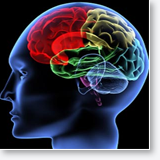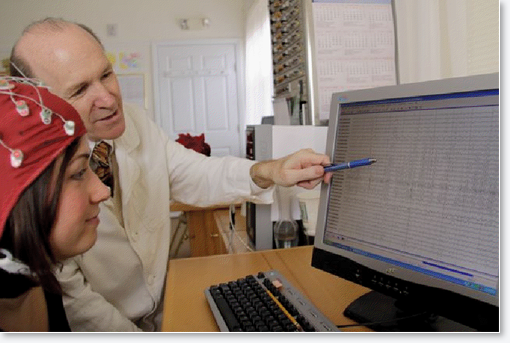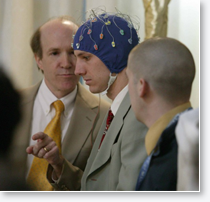
This January, a groundbreaking conference entitled Advances in Meditation Research brought meditation researchers from around the country together to share findings from new studies on a wide range of different meditation traditions, ranging from mindfulness and Zazen to Qi Gong and the Transcendental Meditation technique. The conference, organized by the NAAM Biomedical Society, was held at the New York Academy of Sciences conference center.
After the event, I had the pleasure of interviewing conference speaker Dr. Fred Travis, a prominent brain science researcher who specializes in the effects of TM on brain functioning. Dr. Travis is the Director of the Center for Brain, Consciousness and Cognition at Maharishi University of Management (MUM) in Fairfield, Iowa.

“It was really a bold move to bring together researchers of all these different types of meditation techniques,” said Dr. Travis, when asked about the event. “But the organizers knew we’d all be united by one common belief: that scientific research can help us to better understand the subjective experiences we have during meditation, and the growth of consciousness.”
During his presentation, Travis shared research showing that different types of meditation have different short- and long-term benefits. Referencing his 2010 paper, he delineated three categories of meditation distinguished by their procedures and associated brain patterns: Focused Attention, Open Monitoring and Automatic Self-Transcending.

“Each meditation gives a different angle to explore consciousness,” he said. “And depending on which angle they take, meditators will find different things. Compassion meditation, which is in the Focused Attention category, is found to develop the emotional system in the brain; the whole emotional life of the person becomes richer and fuller. Vipassana meditation, which is in the Open Monitoring category, develops mindfulness of situations and increased mental and physical well-being.
“The Transcendental Meditation program, which is an Automatic Self-transcending meditation, doesn’t develop one particular skill or orientation to activity. Rather, TM leads to a changed state of consciousness. In other types of meditation, you see specific parts of the brain are changing, but with TM practice, you see global alpha coherence. When transcending, the different modules are working together as a whole. This leads to a changed state of consciousness: pure consciousness. Pure consciousness is the experience of inner self-awareness, free of thinking and other mental processes. It is a fourth state of consciousness and is qualitatively different from waking.”
According to Travis, the most far-reaching value of any type of meditation is the difference it can make in the practitioner’s daily life.

“Due to the effect of experience on brain functioning, what you practice during meditation becomes more lively outside of meditation. During TM practice, you enliven total brain functioning. So when you come out, you’re more patient, more flexible, less bothered by stresses.”
Travis and other meditation research scientists will continue this discussion in May during a working conference (no audience) at the Esalen Institute in California. The conference will be held jointly by MUM, IONS (Institute of Noetic Science), and the Esalen Institiute. A primary goal of the conference is creating a list of agreed-upon measures by which all types of meditation can be evaluated.
“These conferences seem to be evidence of a changing quality of consciousness amongst meditation researchers,” says Travis. “It’s very important to appreciate the distinct value of each tradition of meditation and then see how all the different traditions together can lead to a broader understanding of what consciousness is.”
More About Dr. Travis
Since 1990, Dr. Fred Travis has authored 47 papers and made numerous conference presentations that investigate the relation between brain patterns, states of consciousness and meditation practice.
Dr. Travis received his BS in Design and Environmental Analysis from Cornell University and his Masters and PhD in Psychology with a specialization in Psycho Physiology from Maharishi University of Management in 1988. He had a two-year post-doctoral position at UC. Davis exploring brain changes during sleep.
His recent work reports brain patterns and subjective experiences of individuals reporting the experience of higher states of consciousness. Dr. Travis also teaches undergraduate and graduate courses, gives seminars, and speaks at conferences on brain development in children and across the lifespan.
A little bit about the author.
Christine Schrum is a freelance blogger, copywriter, social media pro and a lifelong practitioner of Transcendental Meditation and yoga. You can find her online at www.ChristineSchrum.com




